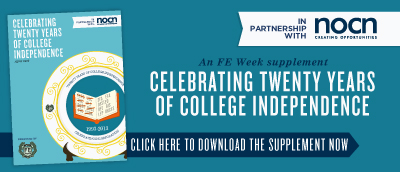Ofsted is just the most recent of the bodies tasked with inspecting further education — but that doesn’t necessarily mean it’s the best says David Sherlock
The English FE sector bears the imprint of its local authority past, when our national provision was unplanned and very uneven in quality — but although it remains unplanned, extreme variations in quality are a thing of the past.
The evening-out and general upgrading of quality was what the Further Education Funding Council (FEFC) inspectorate and its successors, the Training Standards Council (TSC), the Adult Learning Inspectorate (ALI) and Ofsted, were introduced to achieve.
The person who did more than most to create robust FE colleges was Terry Melia, FEFC’s first chief inspector.
He inveigled people like Janice Shiner and me to join as regional senior inspectors.
Our teams had a stiffening of former HMIs as well as former college principals and vice principals who had the experience essential for credible inspection.
And our associate inspectors worked directly for FEFC and, almost to a man and woman, were current FE staff.
A trawl through the FEFC archive held by the Institute of Education should convince anyone of the liberal and collaborative tone of its inspection framework and the very high standard of its college reports.
They might benefit inspection today. FEFC never attempted to sum up a large institution in a single grade. Melia understood that, like their counterparts in universities, some college departments will always be on the rise, some at the peak of their powers and some on the downward slope.
The trick was to identify which, so that would-be students could make an informed choice of course, not just college.
Equally, he was clear that inspection was a snapshot. Any idea that one could use it to make judgements about ‘failing teachers’ as did his contemporary, Chris Woodhead, in schools, or to gaze into the crystal ball and divine a college’s capacity to improve, were inherently flawed.
As with colleges, so with the rest of the extended FE sector — quality was all over the place, but today private providers are just as well regarded as colleges. They perform just as well and are increasingly seen as playing a complementary role to colleges.
The success of the ALI was, like that of the FEFC inspectorate, due to our convincing providers that we were on their side, acknowledging that education and training were hard.
Nothing contributed more to making that message convincing than ALI’s Provider Development Unit which helped providers that had fared badly at inspection to make the first, difficult, steps towards recovery.
What we have now is an FE sector in which too many providers are too small to be viable”
So what remains to be done today? Not more inspection.
Just as the universities and polytechnics did before it, and on shorter timescales, the FE sector has outgrown inspection and should progress to serious self-assessment independently verified by a sector-owned peer review body.
Higher education’s QAA offers a convincing model of how it should be done, the government’s commitment to deregulation provides the right environment and the proposed Charter award carries the means to do it.
The unfinished business is planning for sustainability.
What we have now is an FE sector in which too many providers are too small to be viable, wholly dependent on public funding and heading for the financial buffers.
Wales is currently in the latter stages of planned rationalisation to create fewer, stronger colleges; perhaps a third of the original number.
The much-admired Australian TAFE institutes were created through multiple mergers of local colleges to create institutions big enough and strong enough to stand on their own feet, in creative consultation with state governments rather than being at the mercy, as John Hayes put it, of “impersonal instructions from a remote bureaucracy”.
A parallel suggests a need for 140 or so FE colleges and a reduced number of private and charitable providers, all working together.
The project for the next 20 years?
We need to work towards a real, viable, autonomy rather than the echo of local authority control which remains at the heart of the incorporated colleges of today.
David Sherlock, director of Beyond Standards


Your thoughts